Leadership, Innovation, and Change: Transformational Leadership Report
VerifiedAdded on 2020/05/16
|9
|3203
|48
Report
AI Summary
This report examines the crucial role of emotional intelligence in transformational leadership, particularly within project management. It highlights the need for an integrated approach that balances emotional and rational aspects to achieve project objectives. The report explores the connection between transformational leadership styles and emotional intelligence, emphasizing how project managers must understand people's motivations and enlist their self-interest. It discusses concepts such as the diamond model, career concepts, and VABE to illustrate effective leadership. The article focuses on transformational leadership, its components, and its positive impacts on project performance. It also covers contingency theory and expectancy theory, all contributing to the importance of emotional intelligence in leadership for project success and organizational change. The article also discusses the challenges of managing human behaviors and the importance of project managers possessing both experience and personal characteristics for effective leadership. This report also illustrates the importance of system thinking in project management and the need for the project manager to be able to integrate all the activities of the project.
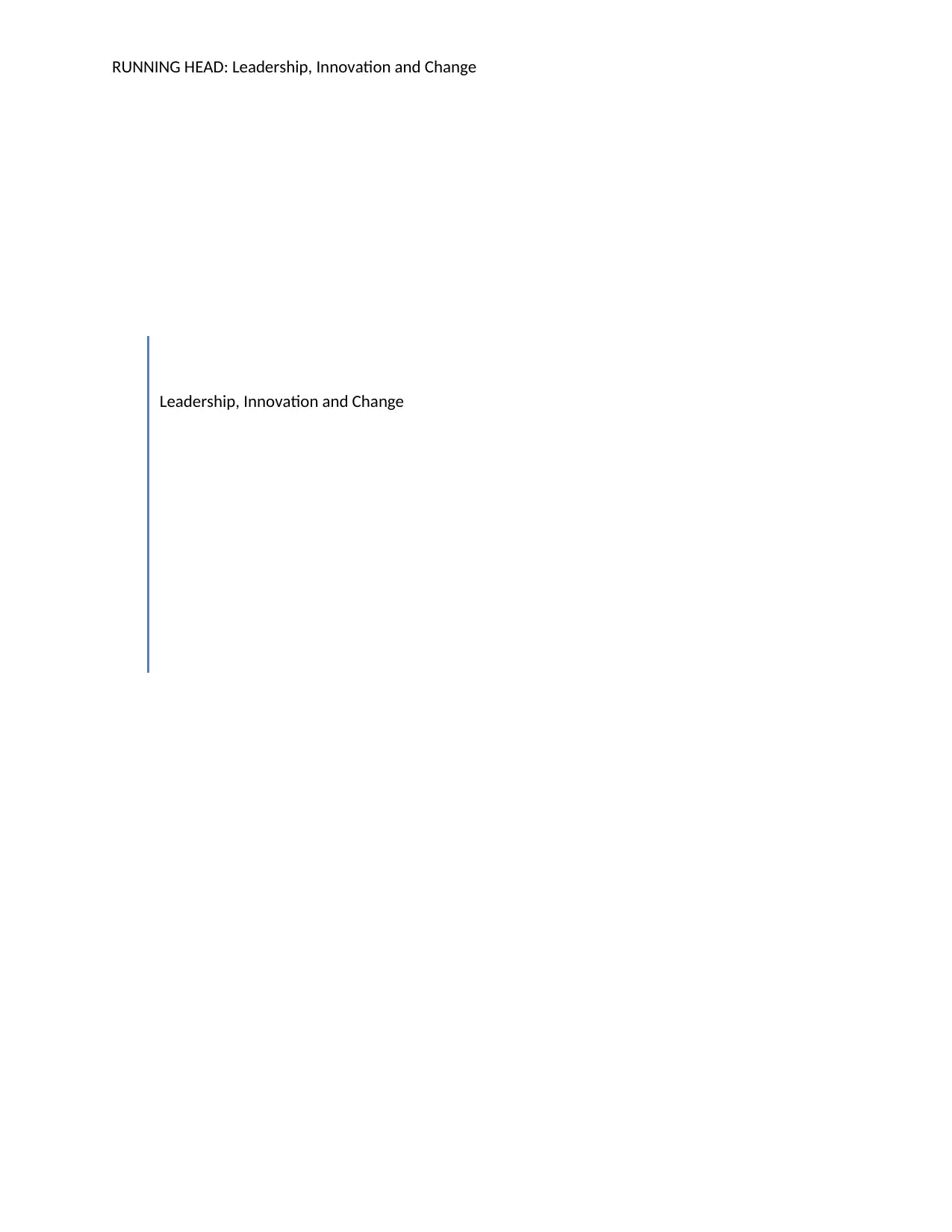
RUNNING HEAD: Leadership, Innovation and Change
Leadership, Innovation and Change
Leadership, Innovation and Change
Paraphrase This Document
Need a fresh take? Get an instant paraphrase of this document with our AI Paraphraser
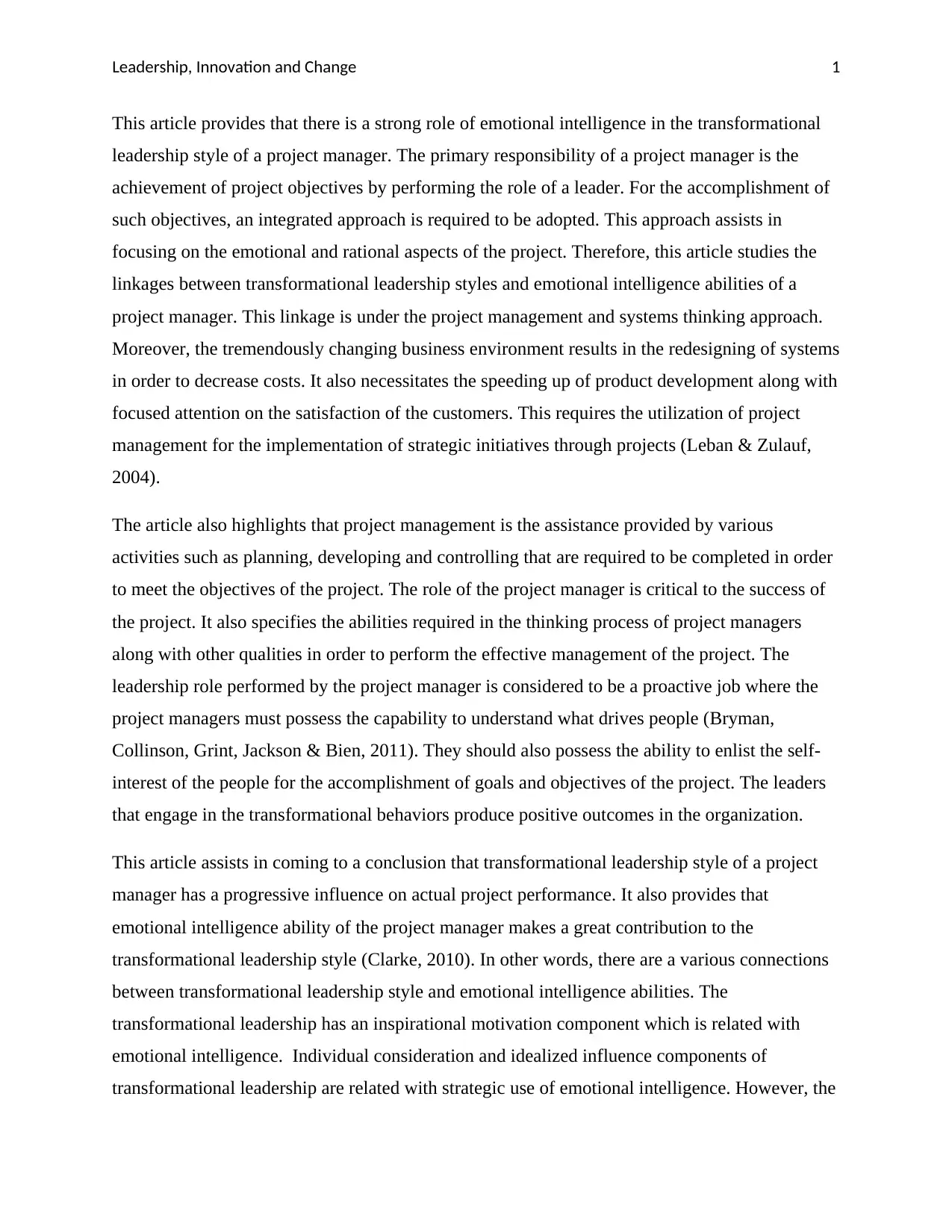
Leadership, Innovation and Change 1
This article provides that there is a strong role of emotional intelligence in the transformational
leadership style of a project manager. The primary responsibility of a project manager is the
achievement of project objectives by performing the role of a leader. For the accomplishment of
such objectives, an integrated approach is required to be adopted. This approach assists in
focusing on the emotional and rational aspects of the project. Therefore, this article studies the
linkages between transformational leadership styles and emotional intelligence abilities of a
project manager. This linkage is under the project management and systems thinking approach.
Moreover, the tremendously changing business environment results in the redesigning of systems
in order to decrease costs. It also necessitates the speeding up of product development along with
focused attention on the satisfaction of the customers. This requires the utilization of project
management for the implementation of strategic initiatives through projects (Leban & Zulauf,
2004).
The article also highlights that project management is the assistance provided by various
activities such as planning, developing and controlling that are required to be completed in order
to meet the objectives of the project. The role of the project manager is critical to the success of
the project. It also specifies the abilities required in the thinking process of project managers
along with other qualities in order to perform the effective management of the project. The
leadership role performed by the project manager is considered to be a proactive job where the
project managers must possess the capability to understand what drives people (Bryman,
Collinson, Grint, Jackson & Bien, 2011). They should also possess the ability to enlist the self-
interest of the people for the accomplishment of goals and objectives of the project. The leaders
that engage in the transformational behaviors produce positive outcomes in the organization.
This article assists in coming to a conclusion that transformational leadership style of a project
manager has a progressive influence on actual project performance. It also provides that
emotional intelligence ability of the project manager makes a great contribution to the
transformational leadership style (Clarke, 2010). In other words, there are a various connections
between transformational leadership style and emotional intelligence abilities. The
transformational leadership has an inspirational motivation component which is related with
emotional intelligence. Individual consideration and idealized influence components of
transformational leadership are related with strategic use of emotional intelligence. However, the
This article provides that there is a strong role of emotional intelligence in the transformational
leadership style of a project manager. The primary responsibility of a project manager is the
achievement of project objectives by performing the role of a leader. For the accomplishment of
such objectives, an integrated approach is required to be adopted. This approach assists in
focusing on the emotional and rational aspects of the project. Therefore, this article studies the
linkages between transformational leadership styles and emotional intelligence abilities of a
project manager. This linkage is under the project management and systems thinking approach.
Moreover, the tremendously changing business environment results in the redesigning of systems
in order to decrease costs. It also necessitates the speeding up of product development along with
focused attention on the satisfaction of the customers. This requires the utilization of project
management for the implementation of strategic initiatives through projects (Leban & Zulauf,
2004).
The article also highlights that project management is the assistance provided by various
activities such as planning, developing and controlling that are required to be completed in order
to meet the objectives of the project. The role of the project manager is critical to the success of
the project. It also specifies the abilities required in the thinking process of project managers
along with other qualities in order to perform the effective management of the project. The
leadership role performed by the project manager is considered to be a proactive job where the
project managers must possess the capability to understand what drives people (Bryman,
Collinson, Grint, Jackson & Bien, 2011). They should also possess the ability to enlist the self-
interest of the people for the accomplishment of goals and objectives of the project. The leaders
that engage in the transformational behaviors produce positive outcomes in the organization.
This article assists in coming to a conclusion that transformational leadership style of a project
manager has a progressive influence on actual project performance. It also provides that
emotional intelligence ability of the project manager makes a great contribution to the
transformational leadership style (Clarke, 2010). In other words, there are a various connections
between transformational leadership style and emotional intelligence abilities. The
transformational leadership has an inspirational motivation component which is related with
emotional intelligence. Individual consideration and idealized influence components of
transformational leadership are related with strategic use of emotional intelligence. However, the
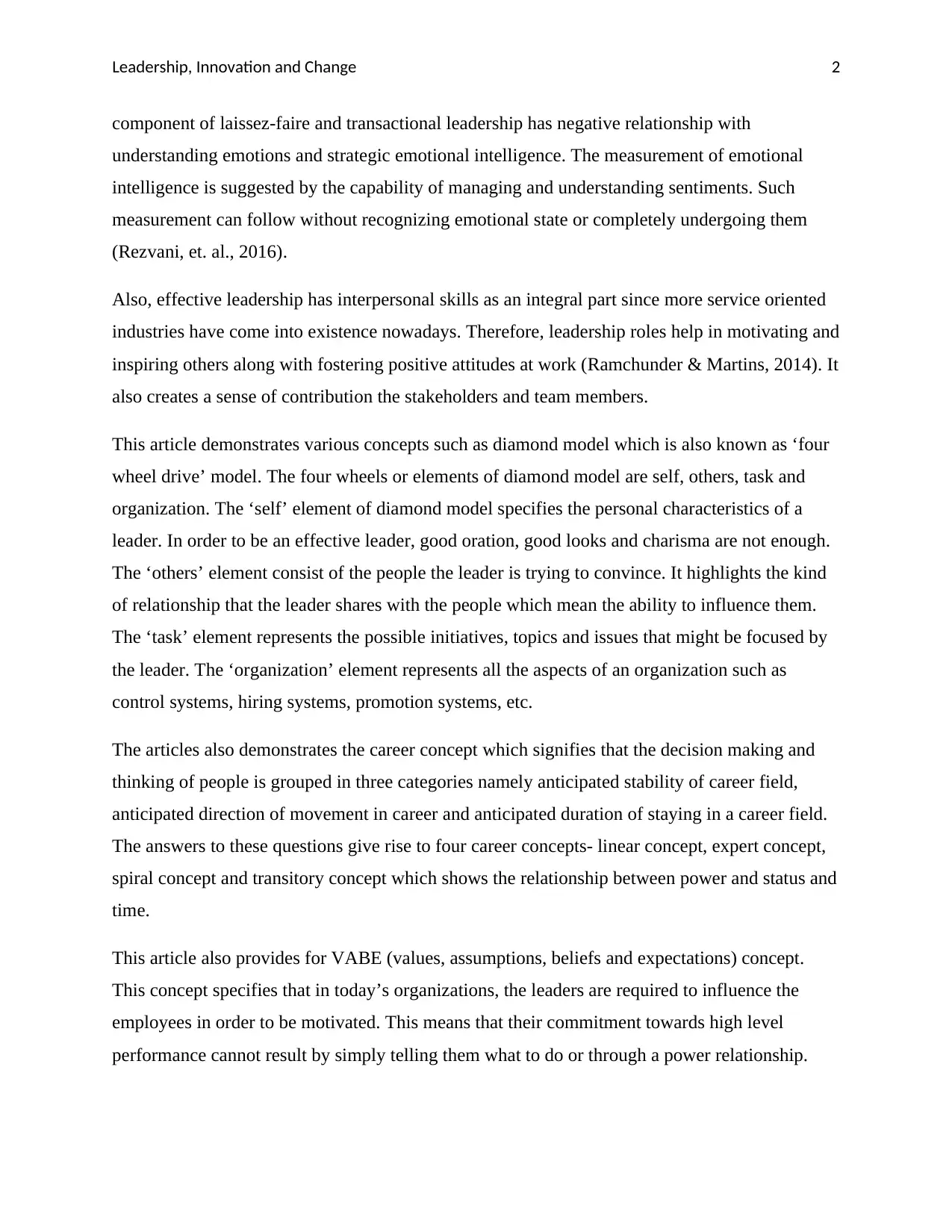
Leadership, Innovation and Change 2
component of laissez-faire and transactional leadership has negative relationship with
understanding emotions and strategic emotional intelligence. The measurement of emotional
intelligence is suggested by the capability of managing and understanding sentiments. Such
measurement can follow without recognizing emotional state or completely undergoing them
(Rezvani, et. al., 2016).
Also, effective leadership has interpersonal skills as an integral part since more service oriented
industries have come into existence nowadays. Therefore, leadership roles help in motivating and
inspiring others along with fostering positive attitudes at work (Ramchunder & Martins, 2014). It
also creates a sense of contribution the stakeholders and team members.
This article demonstrates various concepts such as diamond model which is also known as ‘four
wheel drive’ model. The four wheels or elements of diamond model are self, others, task and
organization. The ‘self’ element of diamond model specifies the personal characteristics of a
leader. In order to be an effective leader, good oration, good looks and charisma are not enough.
The ‘others’ element consist of the people the leader is trying to convince. It highlights the kind
of relationship that the leader shares with the people which mean the ability to influence them.
The ‘task’ element represents the possible initiatives, topics and issues that might be focused by
the leader. The ‘organization’ element represents all the aspects of an organization such as
control systems, hiring systems, promotion systems, etc.
The articles also demonstrates the career concept which signifies that the decision making and
thinking of people is grouped in three categories namely anticipated stability of career field,
anticipated direction of movement in career and anticipated duration of staying in a career field.
The answers to these questions give rise to four career concepts- linear concept, expert concept,
spiral concept and transitory concept which shows the relationship between power and status and
time.
This article also provides for VABE (values, assumptions, beliefs and expectations) concept.
This concept specifies that in today’s organizations, the leaders are required to influence the
employees in order to be motivated. This means that their commitment towards high level
performance cannot result by simply telling them what to do or through a power relationship.
component of laissez-faire and transactional leadership has negative relationship with
understanding emotions and strategic emotional intelligence. The measurement of emotional
intelligence is suggested by the capability of managing and understanding sentiments. Such
measurement can follow without recognizing emotional state or completely undergoing them
(Rezvani, et. al., 2016).
Also, effective leadership has interpersonal skills as an integral part since more service oriented
industries have come into existence nowadays. Therefore, leadership roles help in motivating and
inspiring others along with fostering positive attitudes at work (Ramchunder & Martins, 2014). It
also creates a sense of contribution the stakeholders and team members.
This article demonstrates various concepts such as diamond model which is also known as ‘four
wheel drive’ model. The four wheels or elements of diamond model are self, others, task and
organization. The ‘self’ element of diamond model specifies the personal characteristics of a
leader. In order to be an effective leader, good oration, good looks and charisma are not enough.
The ‘others’ element consist of the people the leader is trying to convince. It highlights the kind
of relationship that the leader shares with the people which mean the ability to influence them.
The ‘task’ element represents the possible initiatives, topics and issues that might be focused by
the leader. The ‘organization’ element represents all the aspects of an organization such as
control systems, hiring systems, promotion systems, etc.
The articles also demonstrates the career concept which signifies that the decision making and
thinking of people is grouped in three categories namely anticipated stability of career field,
anticipated direction of movement in career and anticipated duration of staying in a career field.
The answers to these questions give rise to four career concepts- linear concept, expert concept,
spiral concept and transitory concept which shows the relationship between power and status and
time.
This article also provides for VABE (values, assumptions, beliefs and expectations) concept.
This concept specifies that in today’s organizations, the leaders are required to influence the
employees in order to be motivated. This means that their commitment towards high level
performance cannot result by simply telling them what to do or through a power relationship.
⊘ This is a preview!⊘
Do you want full access?
Subscribe today to unlock all pages.

Trusted by 1+ million students worldwide
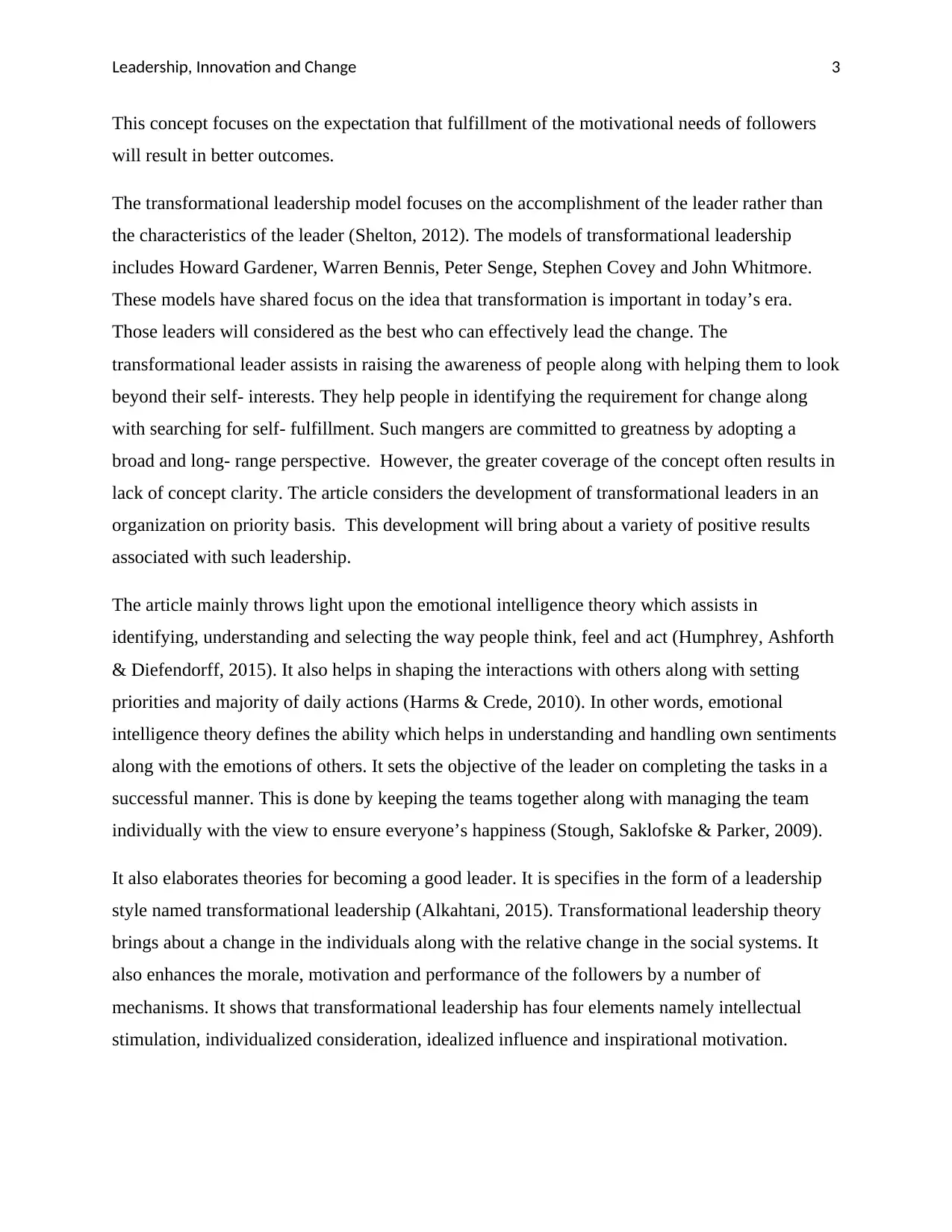
Leadership, Innovation and Change 3
This concept focuses on the expectation that fulfillment of the motivational needs of followers
will result in better outcomes.
The transformational leadership model focuses on the accomplishment of the leader rather than
the characteristics of the leader (Shelton, 2012). The models of transformational leadership
includes Howard Gardener, Warren Bennis, Peter Senge, Stephen Covey and John Whitmore.
These models have shared focus on the idea that transformation is important in today’s era.
Those leaders will considered as the best who can effectively lead the change. The
transformational leader assists in raising the awareness of people along with helping them to look
beyond their self- interests. They help people in identifying the requirement for change along
with searching for self- fulfillment. Such mangers are committed to greatness by adopting a
broad and long- range perspective. However, the greater coverage of the concept often results in
lack of concept clarity. The article considers the development of transformational leaders in an
organization on priority basis. This development will bring about a variety of positive results
associated with such leadership.
The article mainly throws light upon the emotional intelligence theory which assists in
identifying, understanding and selecting the way people think, feel and act (Humphrey, Ashforth
& Diefendorff, 2015). It also helps in shaping the interactions with others along with setting
priorities and majority of daily actions (Harms & Crede, 2010). In other words, emotional
intelligence theory defines the ability which helps in understanding and handling own sentiments
along with the emotions of others. It sets the objective of the leader on completing the tasks in a
successful manner. This is done by keeping the teams together along with managing the team
individually with the view to ensure everyone’s happiness (Stough, Saklofske & Parker, 2009).
It also elaborates theories for becoming a good leader. It is specifies in the form of a leadership
style named transformational leadership (Alkahtani, 2015). Transformational leadership theory
brings about a change in the individuals along with the relative change in the social systems. It
also enhances the morale, motivation and performance of the followers by a number of
mechanisms. It shows that transformational leadership has four elements namely intellectual
stimulation, individualized consideration, idealized influence and inspirational motivation.
This concept focuses on the expectation that fulfillment of the motivational needs of followers
will result in better outcomes.
The transformational leadership model focuses on the accomplishment of the leader rather than
the characteristics of the leader (Shelton, 2012). The models of transformational leadership
includes Howard Gardener, Warren Bennis, Peter Senge, Stephen Covey and John Whitmore.
These models have shared focus on the idea that transformation is important in today’s era.
Those leaders will considered as the best who can effectively lead the change. The
transformational leader assists in raising the awareness of people along with helping them to look
beyond their self- interests. They help people in identifying the requirement for change along
with searching for self- fulfillment. Such mangers are committed to greatness by adopting a
broad and long- range perspective. However, the greater coverage of the concept often results in
lack of concept clarity. The article considers the development of transformational leaders in an
organization on priority basis. This development will bring about a variety of positive results
associated with such leadership.
The article mainly throws light upon the emotional intelligence theory which assists in
identifying, understanding and selecting the way people think, feel and act (Humphrey, Ashforth
& Diefendorff, 2015). It also helps in shaping the interactions with others along with setting
priorities and majority of daily actions (Harms & Crede, 2010). In other words, emotional
intelligence theory defines the ability which helps in understanding and handling own sentiments
along with the emotions of others. It sets the objective of the leader on completing the tasks in a
successful manner. This is done by keeping the teams together along with managing the team
individually with the view to ensure everyone’s happiness (Stough, Saklofske & Parker, 2009).
It also elaborates theories for becoming a good leader. It is specifies in the form of a leadership
style named transformational leadership (Alkahtani, 2015). Transformational leadership theory
brings about a change in the individuals along with the relative change in the social systems. It
also enhances the morale, motivation and performance of the followers by a number of
mechanisms. It shows that transformational leadership has four elements namely intellectual
stimulation, individualized consideration, idealized influence and inspirational motivation.
Paraphrase This Document
Need a fresh take? Get an instant paraphrase of this document with our AI Paraphraser
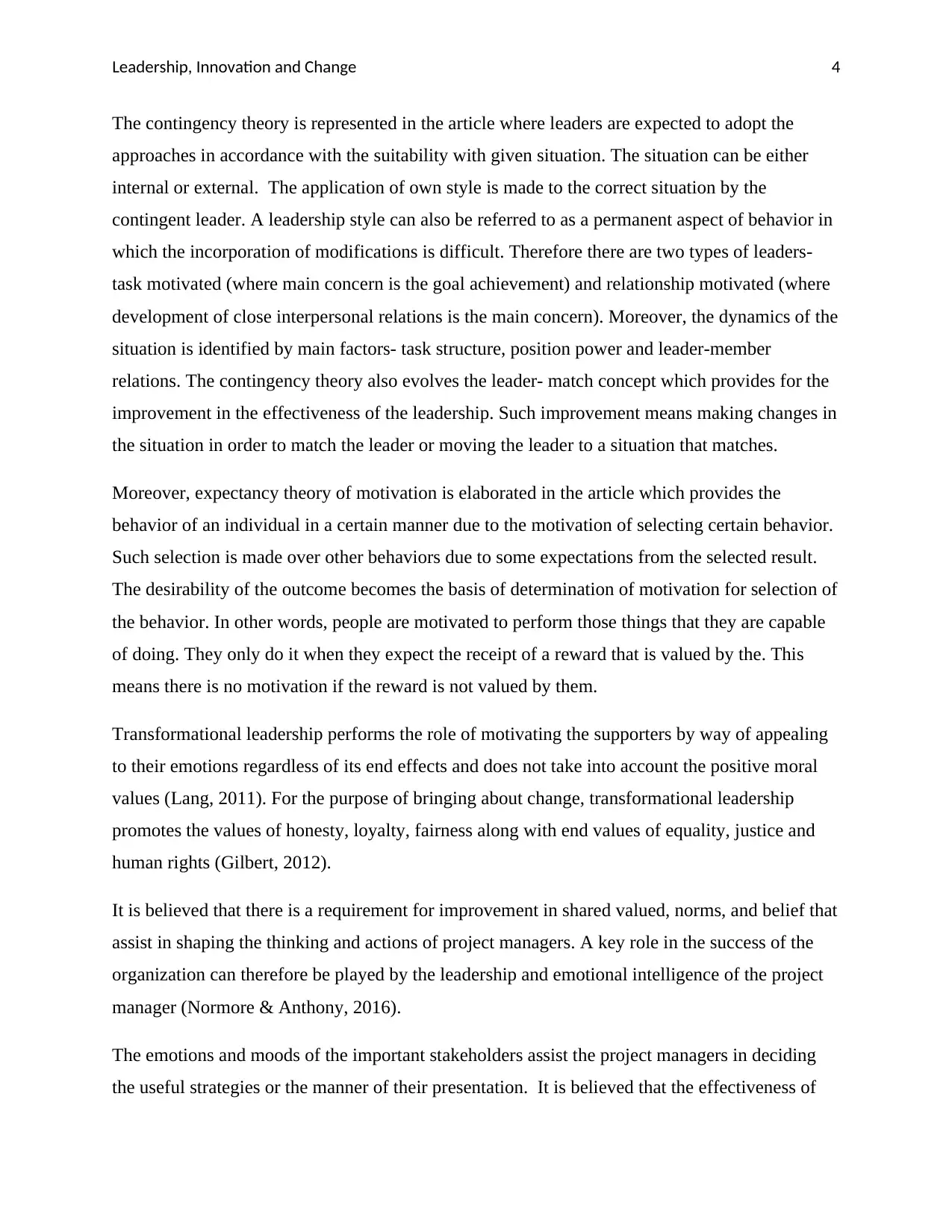
Leadership, Innovation and Change 4
The contingency theory is represented in the article where leaders are expected to adopt the
approaches in accordance with the suitability with given situation. The situation can be either
internal or external. The application of own style is made to the correct situation by the
contingent leader. A leadership style can also be referred to as a permanent aspect of behavior in
which the incorporation of modifications is difficult. Therefore there are two types of leaders-
task motivated (where main concern is the goal achievement) and relationship motivated (where
development of close interpersonal relations is the main concern). Moreover, the dynamics of the
situation is identified by main factors- task structure, position power and leader-member
relations. The contingency theory also evolves the leader- match concept which provides for the
improvement in the effectiveness of the leadership. Such improvement means making changes in
the situation in order to match the leader or moving the leader to a situation that matches.
Moreover, expectancy theory of motivation is elaborated in the article which provides the
behavior of an individual in a certain manner due to the motivation of selecting certain behavior.
Such selection is made over other behaviors due to some expectations from the selected result.
The desirability of the outcome becomes the basis of determination of motivation for selection of
the behavior. In other words, people are motivated to perform those things that they are capable
of doing. They only do it when they expect the receipt of a reward that is valued by the. This
means there is no motivation if the reward is not valued by them.
Transformational leadership performs the role of motivating the supporters by way of appealing
to their emotions regardless of its end effects and does not take into account the positive moral
values (Lang, 2011). For the purpose of bringing about change, transformational leadership
promotes the values of honesty, loyalty, fairness along with end values of equality, justice and
human rights (Gilbert, 2012).
It is believed that there is a requirement for improvement in shared valued, norms, and belief that
assist in shaping the thinking and actions of project managers. A key role in the success of the
organization can therefore be played by the leadership and emotional intelligence of the project
manager (Normore & Anthony, 2016).
The emotions and moods of the important stakeholders assist the project managers in deciding
the useful strategies or the manner of their presentation. It is believed that the effectiveness of
The contingency theory is represented in the article where leaders are expected to adopt the
approaches in accordance with the suitability with given situation. The situation can be either
internal or external. The application of own style is made to the correct situation by the
contingent leader. A leadership style can also be referred to as a permanent aspect of behavior in
which the incorporation of modifications is difficult. Therefore there are two types of leaders-
task motivated (where main concern is the goal achievement) and relationship motivated (where
development of close interpersonal relations is the main concern). Moreover, the dynamics of the
situation is identified by main factors- task structure, position power and leader-member
relations. The contingency theory also evolves the leader- match concept which provides for the
improvement in the effectiveness of the leadership. Such improvement means making changes in
the situation in order to match the leader or moving the leader to a situation that matches.
Moreover, expectancy theory of motivation is elaborated in the article which provides the
behavior of an individual in a certain manner due to the motivation of selecting certain behavior.
Such selection is made over other behaviors due to some expectations from the selected result.
The desirability of the outcome becomes the basis of determination of motivation for selection of
the behavior. In other words, people are motivated to perform those things that they are capable
of doing. They only do it when they expect the receipt of a reward that is valued by the. This
means there is no motivation if the reward is not valued by them.
Transformational leadership performs the role of motivating the supporters by way of appealing
to their emotions regardless of its end effects and does not take into account the positive moral
values (Lang, 2011). For the purpose of bringing about change, transformational leadership
promotes the values of honesty, loyalty, fairness along with end values of equality, justice and
human rights (Gilbert, 2012).
It is believed that there is a requirement for improvement in shared valued, norms, and belief that
assist in shaping the thinking and actions of project managers. A key role in the success of the
organization can therefore be played by the leadership and emotional intelligence of the project
manager (Normore & Anthony, 2016).
The emotions and moods of the important stakeholders assist the project managers in deciding
the useful strategies or the manner of their presentation. It is believed that the effectiveness of
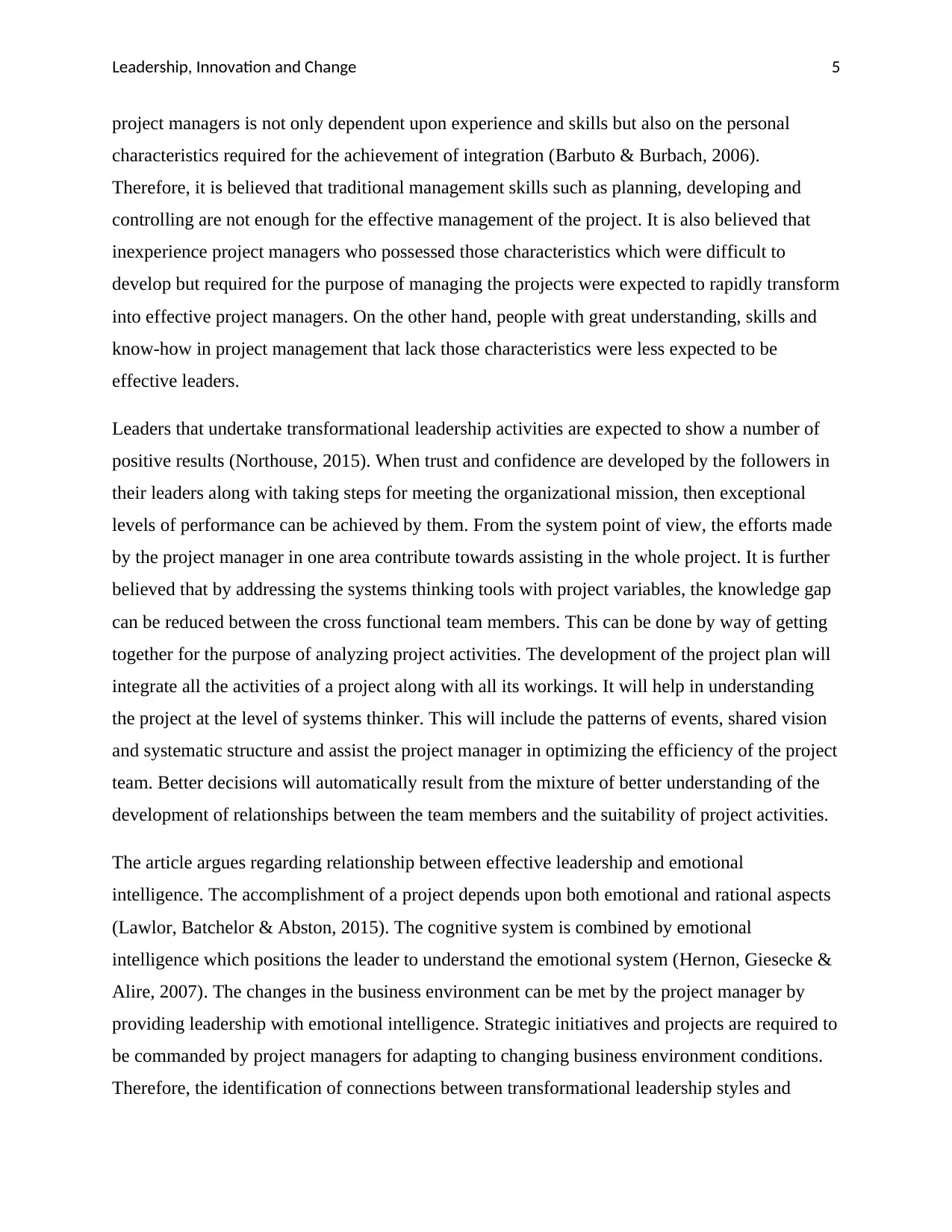
Leadership, Innovation and Change 5
project managers is not only dependent upon experience and skills but also on the personal
characteristics required for the achievement of integration (Barbuto & Burbach, 2006).
Therefore, it is believed that traditional management skills such as planning, developing and
controlling are not enough for the effective management of the project. It is also believed that
inexperience project managers who possessed those characteristics which were difficult to
develop but required for the purpose of managing the projects were expected to rapidly transform
into effective project managers. On the other hand, people with great understanding, skills and
know-how in project management that lack those characteristics were less expected to be
effective leaders.
Leaders that undertake transformational leadership activities are expected to show a number of
positive results (Northouse, 2015). When trust and confidence are developed by the followers in
their leaders along with taking steps for meeting the organizational mission, then exceptional
levels of performance can be achieved by them. From the system point of view, the efforts made
by the project manager in one area contribute towards assisting in the whole project. It is further
believed that by addressing the systems thinking tools with project variables, the knowledge gap
can be reduced between the cross functional team members. This can be done by way of getting
together for the purpose of analyzing project activities. The development of the project plan will
integrate all the activities of a project along with all its workings. It will help in understanding
the project at the level of systems thinker. This will include the patterns of events, shared vision
and systematic structure and assist the project manager in optimizing the efficiency of the project
team. Better decisions will automatically result from the mixture of better understanding of the
development of relationships between the team members and the suitability of project activities.
The article argues regarding relationship between effective leadership and emotional
intelligence. The accomplishment of a project depends upon both emotional and rational aspects
(Lawlor, Batchelor & Abston, 2015). The cognitive system is combined by emotional
intelligence which positions the leader to understand the emotional system (Hernon, Giesecke &
Alire, 2007). The changes in the business environment can be met by the project manager by
providing leadership with emotional intelligence. Strategic initiatives and projects are required to
be commanded by project managers for adapting to changing business environment conditions.
Therefore, the identification of connections between transformational leadership styles and
project managers is not only dependent upon experience and skills but also on the personal
characteristics required for the achievement of integration (Barbuto & Burbach, 2006).
Therefore, it is believed that traditional management skills such as planning, developing and
controlling are not enough for the effective management of the project. It is also believed that
inexperience project managers who possessed those characteristics which were difficult to
develop but required for the purpose of managing the projects were expected to rapidly transform
into effective project managers. On the other hand, people with great understanding, skills and
know-how in project management that lack those characteristics were less expected to be
effective leaders.
Leaders that undertake transformational leadership activities are expected to show a number of
positive results (Northouse, 2015). When trust and confidence are developed by the followers in
their leaders along with taking steps for meeting the organizational mission, then exceptional
levels of performance can be achieved by them. From the system point of view, the efforts made
by the project manager in one area contribute towards assisting in the whole project. It is further
believed that by addressing the systems thinking tools with project variables, the knowledge gap
can be reduced between the cross functional team members. This can be done by way of getting
together for the purpose of analyzing project activities. The development of the project plan will
integrate all the activities of a project along with all its workings. It will help in understanding
the project at the level of systems thinker. This will include the patterns of events, shared vision
and systematic structure and assist the project manager in optimizing the efficiency of the project
team. Better decisions will automatically result from the mixture of better understanding of the
development of relationships between the team members and the suitability of project activities.
The article argues regarding relationship between effective leadership and emotional
intelligence. The accomplishment of a project depends upon both emotional and rational aspects
(Lawlor, Batchelor & Abston, 2015). The cognitive system is combined by emotional
intelligence which positions the leader to understand the emotional system (Hernon, Giesecke &
Alire, 2007). The changes in the business environment can be met by the project manager by
providing leadership with emotional intelligence. Strategic initiatives and projects are required to
be commanded by project managers for adapting to changing business environment conditions.
Therefore, the identification of connections between transformational leadership styles and
⊘ This is a preview!⊘
Do you want full access?
Subscribe today to unlock all pages.

Trusted by 1+ million students worldwide
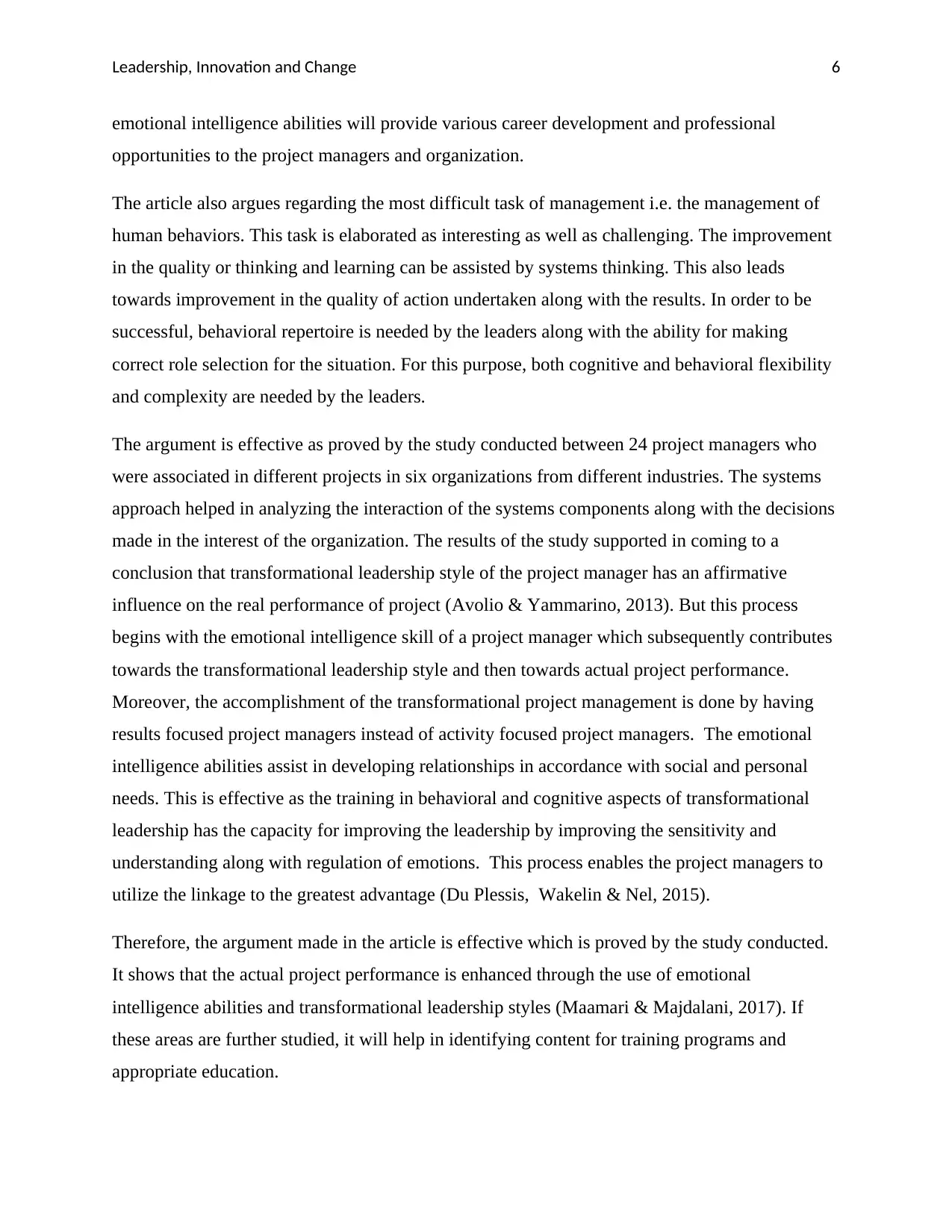
Leadership, Innovation and Change 6
emotional intelligence abilities will provide various career development and professional
opportunities to the project managers and organization.
The article also argues regarding the most difficult task of management i.e. the management of
human behaviors. This task is elaborated as interesting as well as challenging. The improvement
in the quality or thinking and learning can be assisted by systems thinking. This also leads
towards improvement in the quality of action undertaken along with the results. In order to be
successful, behavioral repertoire is needed by the leaders along with the ability for making
correct role selection for the situation. For this purpose, both cognitive and behavioral flexibility
and complexity are needed by the leaders.
The argument is effective as proved by the study conducted between 24 project managers who
were associated in different projects in six organizations from different industries. The systems
approach helped in analyzing the interaction of the systems components along with the decisions
made in the interest of the organization. The results of the study supported in coming to a
conclusion that transformational leadership style of the project manager has an affirmative
influence on the real performance of project (Avolio & Yammarino, 2013). But this process
begins with the emotional intelligence skill of a project manager which subsequently contributes
towards the transformational leadership style and then towards actual project performance.
Moreover, the accomplishment of the transformational project management is done by having
results focused project managers instead of activity focused project managers. The emotional
intelligence abilities assist in developing relationships in accordance with social and personal
needs. This is effective as the training in behavioral and cognitive aspects of transformational
leadership has the capacity for improving the leadership by improving the sensitivity and
understanding along with regulation of emotions. This process enables the project managers to
utilize the linkage to the greatest advantage (Du Plessis, Wakelin & Nel, 2015).
Therefore, the argument made in the article is effective which is proved by the study conducted.
It shows that the actual project performance is enhanced through the use of emotional
intelligence abilities and transformational leadership styles (Maamari & Majdalani, 2017). If
these areas are further studied, it will help in identifying content for training programs and
appropriate education.
emotional intelligence abilities will provide various career development and professional
opportunities to the project managers and organization.
The article also argues regarding the most difficult task of management i.e. the management of
human behaviors. This task is elaborated as interesting as well as challenging. The improvement
in the quality or thinking and learning can be assisted by systems thinking. This also leads
towards improvement in the quality of action undertaken along with the results. In order to be
successful, behavioral repertoire is needed by the leaders along with the ability for making
correct role selection for the situation. For this purpose, both cognitive and behavioral flexibility
and complexity are needed by the leaders.
The argument is effective as proved by the study conducted between 24 project managers who
were associated in different projects in six organizations from different industries. The systems
approach helped in analyzing the interaction of the systems components along with the decisions
made in the interest of the organization. The results of the study supported in coming to a
conclusion that transformational leadership style of the project manager has an affirmative
influence on the real performance of project (Avolio & Yammarino, 2013). But this process
begins with the emotional intelligence skill of a project manager which subsequently contributes
towards the transformational leadership style and then towards actual project performance.
Moreover, the accomplishment of the transformational project management is done by having
results focused project managers instead of activity focused project managers. The emotional
intelligence abilities assist in developing relationships in accordance with social and personal
needs. This is effective as the training in behavioral and cognitive aspects of transformational
leadership has the capacity for improving the leadership by improving the sensitivity and
understanding along with regulation of emotions. This process enables the project managers to
utilize the linkage to the greatest advantage (Du Plessis, Wakelin & Nel, 2015).
Therefore, the argument made in the article is effective which is proved by the study conducted.
It shows that the actual project performance is enhanced through the use of emotional
intelligence abilities and transformational leadership styles (Maamari & Majdalani, 2017). If
these areas are further studied, it will help in identifying content for training programs and
appropriate education.
Paraphrase This Document
Need a fresh take? Get an instant paraphrase of this document with our AI Paraphraser
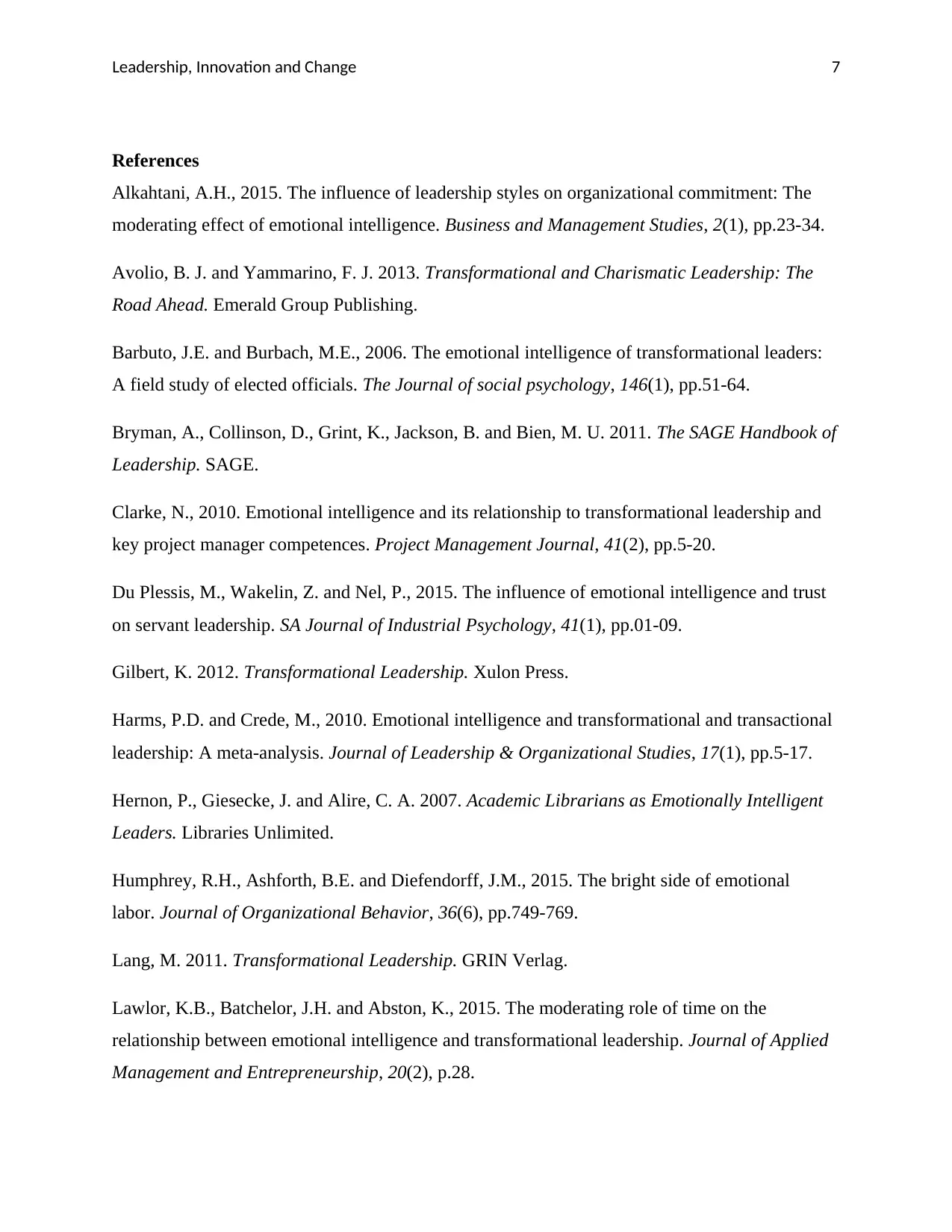
Leadership, Innovation and Change 7
References
Alkahtani, A.H., 2015. The influence of leadership styles on organizational commitment: The
moderating effect of emotional intelligence. Business and Management Studies, 2(1), pp.23-34.
Avolio, B. J. and Yammarino, F. J. 2013. Transformational and Charismatic Leadership: The
Road Ahead. Emerald Group Publishing.
Barbuto, J.E. and Burbach, M.E., 2006. The emotional intelligence of transformational leaders:
A field study of elected officials. The Journal of social psychology, 146(1), pp.51-64.
Bryman, A., Collinson, D., Grint, K., Jackson, B. and Bien, M. U. 2011. The SAGE Handbook of
Leadership. SAGE.
Clarke, N., 2010. Emotional intelligence and its relationship to transformational leadership and
key project manager competences. Project Management Journal, 41(2), pp.5-20.
Du Plessis, M., Wakelin, Z. and Nel, P., 2015. The influence of emotional intelligence and trust
on servant leadership. SA Journal of Industrial Psychology, 41(1), pp.01-09.
Gilbert, K. 2012. Transformational Leadership. Xulon Press.
Harms, P.D. and Crede, M., 2010. Emotional intelligence and transformational and transactional
leadership: A meta-analysis. Journal of Leadership & Organizational Studies, 17(1), pp.5-17.
Hernon, P., Giesecke, J. and Alire, C. A. 2007. Academic Librarians as Emotionally Intelligent
Leaders. Libraries Unlimited.
Humphrey, R.H., Ashforth, B.E. and Diefendorff, J.M., 2015. The bright side of emotional
labor. Journal of Organizational Behavior, 36(6), pp.749-769.
Lang, M. 2011. Transformational Leadership. GRIN Verlag.
Lawlor, K.B., Batchelor, J.H. and Abston, K., 2015. The moderating role of time on the
relationship between emotional intelligence and transformational leadership. Journal of Applied
Management and Entrepreneurship, 20(2), p.28.
References
Alkahtani, A.H., 2015. The influence of leadership styles on organizational commitment: The
moderating effect of emotional intelligence. Business and Management Studies, 2(1), pp.23-34.
Avolio, B. J. and Yammarino, F. J. 2013. Transformational and Charismatic Leadership: The
Road Ahead. Emerald Group Publishing.
Barbuto, J.E. and Burbach, M.E., 2006. The emotional intelligence of transformational leaders:
A field study of elected officials. The Journal of social psychology, 146(1), pp.51-64.
Bryman, A., Collinson, D., Grint, K., Jackson, B. and Bien, M. U. 2011. The SAGE Handbook of
Leadership. SAGE.
Clarke, N., 2010. Emotional intelligence and its relationship to transformational leadership and
key project manager competences. Project Management Journal, 41(2), pp.5-20.
Du Plessis, M., Wakelin, Z. and Nel, P., 2015. The influence of emotional intelligence and trust
on servant leadership. SA Journal of Industrial Psychology, 41(1), pp.01-09.
Gilbert, K. 2012. Transformational Leadership. Xulon Press.
Harms, P.D. and Crede, M., 2010. Emotional intelligence and transformational and transactional
leadership: A meta-analysis. Journal of Leadership & Organizational Studies, 17(1), pp.5-17.
Hernon, P., Giesecke, J. and Alire, C. A. 2007. Academic Librarians as Emotionally Intelligent
Leaders. Libraries Unlimited.
Humphrey, R.H., Ashforth, B.E. and Diefendorff, J.M., 2015. The bright side of emotional
labor. Journal of Organizational Behavior, 36(6), pp.749-769.
Lang, M. 2011. Transformational Leadership. GRIN Verlag.
Lawlor, K.B., Batchelor, J.H. and Abston, K., 2015. The moderating role of time on the
relationship between emotional intelligence and transformational leadership. Journal of Applied
Management and Entrepreneurship, 20(2), p.28.
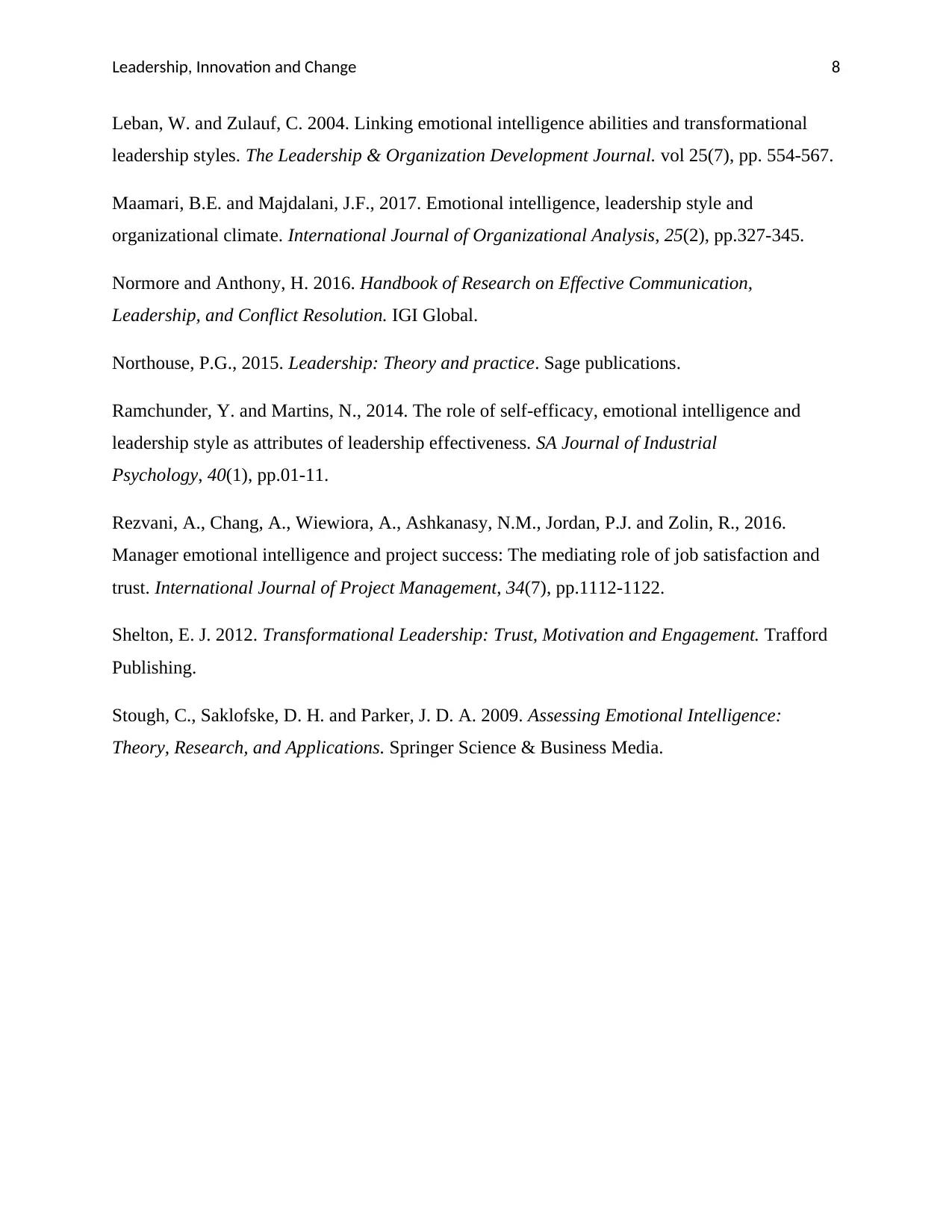
Leadership, Innovation and Change 8
Leban, W. and Zulauf, C. 2004. Linking emotional intelligence abilities and transformational
leadership styles. The Leadership & Organization Development Journal. vol 25(7), pp. 554-567.
Maamari, B.E. and Majdalani, J.F., 2017. Emotional intelligence, leadership style and
organizational climate. International Journal of Organizational Analysis, 25(2), pp.327-345.
Normore and Anthony, H. 2016. Handbook of Research on Effective Communication,
Leadership, and Conflict Resolution. IGI Global.
Northouse, P.G., 2015. Leadership: Theory and practice. Sage publications.
Ramchunder, Y. and Martins, N., 2014. The role of self-efficacy, emotional intelligence and
leadership style as attributes of leadership effectiveness. SA Journal of Industrial
Psychology, 40(1), pp.01-11.
Rezvani, A., Chang, A., Wiewiora, A., Ashkanasy, N.M., Jordan, P.J. and Zolin, R., 2016.
Manager emotional intelligence and project success: The mediating role of job satisfaction and
trust. International Journal of Project Management, 34(7), pp.1112-1122.
Shelton, E. J. 2012. Transformational Leadership: Trust, Motivation and Engagement. Trafford
Publishing.
Stough, C., Saklofske, D. H. and Parker, J. D. A. 2009. Assessing Emotional Intelligence:
Theory, Research, and Applications. Springer Science & Business Media.
Leban, W. and Zulauf, C. 2004. Linking emotional intelligence abilities and transformational
leadership styles. The Leadership & Organization Development Journal. vol 25(7), pp. 554-567.
Maamari, B.E. and Majdalani, J.F., 2017. Emotional intelligence, leadership style and
organizational climate. International Journal of Organizational Analysis, 25(2), pp.327-345.
Normore and Anthony, H. 2016. Handbook of Research on Effective Communication,
Leadership, and Conflict Resolution. IGI Global.
Northouse, P.G., 2015. Leadership: Theory and practice. Sage publications.
Ramchunder, Y. and Martins, N., 2014. The role of self-efficacy, emotional intelligence and
leadership style as attributes of leadership effectiveness. SA Journal of Industrial
Psychology, 40(1), pp.01-11.
Rezvani, A., Chang, A., Wiewiora, A., Ashkanasy, N.M., Jordan, P.J. and Zolin, R., 2016.
Manager emotional intelligence and project success: The mediating role of job satisfaction and
trust. International Journal of Project Management, 34(7), pp.1112-1122.
Shelton, E. J. 2012. Transformational Leadership: Trust, Motivation and Engagement. Trafford
Publishing.
Stough, C., Saklofske, D. H. and Parker, J. D. A. 2009. Assessing Emotional Intelligence:
Theory, Research, and Applications. Springer Science & Business Media.
⊘ This is a preview!⊘
Do you want full access?
Subscribe today to unlock all pages.

Trusted by 1+ million students worldwide
1 out of 9
Related Documents
Your All-in-One AI-Powered Toolkit for Academic Success.
+13062052269
info@desklib.com
Available 24*7 on WhatsApp / Email
![[object Object]](/_next/static/media/star-bottom.7253800d.svg)
Unlock your academic potential
Copyright © 2020–2026 A2Z Services. All Rights Reserved. Developed and managed by ZUCOL.





